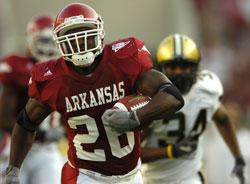All athletes encounter countless opportunities to learn life lessons over their respective sports journeys. While many struggle from poor decisions, a select few use those same experiences to adjust and create their game plan for success. De’Arrius Howard, former Arkansas Razorback, is one athlete that gained incredible wisdom from his childhood and adult sports experiences. Many who know him comment on his smile, his maturity, and his poise. What’s most impressive is the way he approached the game of football, his leadership, and his legacy. Because Howard had such great insight and advice to share, we have divided his interview into two parts. Read Part One to learn about his journey from SEC football to the pros to Corporate America!
Part one of a two-part interview:
De’Arrius Howard is not a jock. Well, he is not just a jock. He played football on the professional level in the highly competitive position of running back but he doesn’t want to be known as only an athlete. He is an accomplished executive at a fortune 500 company, a scholar, a father, a son, a husband, and a friend, among many other things. He has seen those around him flourish and flounder based solely on their attitude and understands the importance of personal branding. He candidly shares advice on everything from finance to personal branding in this two-part interview.
TAN: “Having come from West Memphis, Arkansas, what experiences from home best equipped you for life as an athlete?”
DH: “I didn’t want to be the person who showed so much promise as a young person and then failed. Like I often share with young people, it’s not just your family that you are representing or your parents it’s so much bigger than that. You aren’t even just representing yourself or the name on the front of your jersey. You’re a spokesperson for your entire town. If you get caught in some scandal, your hometown news is going to cover it. Your actions affect others. I wanted to be an example of someone who succeeded. Even at a young age, I had a plan. I had a specific plan. I speak to young student-athletes and I encourage them to make a plan – a realistic plan you can achieve. I knew I wanted to use football to graduate from college, to be financially secure. I accomplished both those things. I later decided I want to get my MBA with a 3.5 GPA, and I did that as well.”
TAN: “What did sports teach you about corporate America?”
DH: “Once I knew football wasn’t going to work out, I challenged myself and decided to join corporate America. It was different. Your mind and body have been trained to do something day in and out for years, so I had to adjust. But after only a few short months, I realized Corporate America is still a team sport. You must know your players. You must understand your leadership. They are just like coaches. Some like to micromanage, while others let you spread your wings. One thing that always stayed in the back of my mind was that one bad play and your professional career is over. But, no one can take your education away.”
TAN: “You were heavily recruited out of high school. Could you share with our readers what the recruiting process was like? What did you expect to get out of your college experience?”
DH: “The recruiting process was overwhelming. The calls to my parent’s house, aunt and uncle’s home, my grandmother’s house…it was just overwhelming. Literally up until my signing day, I had three hats in a bag,” He laughs. “The University of Tennessee, The University of Miami, and The University of Arkansas and I reached in there and pulled out the hat. That’s how I made my decision. I was a seventeen-year-old kid. Not only was I trying to make good grades and play well, I had schools calling me. I had reporters calling. I didn’t want to let anyone down. I had people trying to persuade me to go one school versus another. It got to the point I was fed up with the entire process.”
TAN: “What do you think could have helped you navigate that process more easily?”
DH: “Just speaking and talking to someone who had been through that ordeal. I had a friend whose brother was playing at Ole Miss, but I didn’t have access to him all the time. Just to have those conversations would have helped tremendously. To have someone to say, ‘Things are going to get a little overwhelming but at that point you need to let your coach or parents speak for you.’ I didn’t have that resource.”
TAN: “Collegiate experiences are so varied. It’s difficult to prepare students for what playing in college will be like other than, the expectations are higher and you need to be good at time management and prioritizing tasks. What advice would you give a collegiate player that is transitioning to professional sports?”
DH: “The first thing would be to get a great financial advisor! I’m not talking about an aunt or cousin that runs their own business. I mean someone who has a track record for making and retaining their client’s money. You need someone to tell you, “no.” You literally going from being a broke college kid that can budget one hundred dollars for an entire month to having more money than anyone in your family can earn in a year. You need professional help. It’s like putting a kid in a candy store with no one to tell you, “no.”
In the next segment, we discuss more on financial wisdom, cultivating your personal brand, how to say no and mean it, how to give back to your loved ones without jeopardizing your future, life after sports, and so much more! Stay tuned…
-By LaToya Baker of The Athlete’s NeXus
